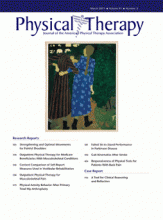“The farther backward you can look, the farther forward you are likely to see.” —Winston Churchill
We welcome and thank Sahrmann for her thoughtful and probing comments1 on our perspective article.2 The purpose of the Physical Therapy and Society Summit (PASS) meeting, as stated in the 2006 House of Delegates motion, was to convene a summit that would focus on how “physical therapists can meet current, evolving, and future societal needs.”3
The planning for this event, including readings and online discussion prior to the Summit, was to prompt thought leaders to identify areas of opportunity and need. (It should be noted that the physical therapy participants at this meeting were chosen from a list of individuals who self-identified—answering a call to participation to our membership—their interest and commitment to this topic. This self-initiation is, in itself, a paradigm shift from the usual practice of sending invitations to those identified by present leadership as individuals who should participate.)
We address Sahrmann's comments in the order they were raised.
General directions
Sahrmann points out that the reference to a paradigm shift might not be understood by the reader. She rightly states that, from her perspective, the patient is the focus of care. Those at the Summit agreed wholeheartedly with this perspective, but, in fact, felt that the profession as a whole was not seen this way, nor did it portray itself in a way that would make this patient-centered focus evident to our clients/patients and to society at large.
In the perspective article, we referenced Purtilo's Mary McMillan Lecture,4 in which she discussed the history of physical therapy in terms of seasons or periods where we, as a profession, matured to the point of “Societal …












